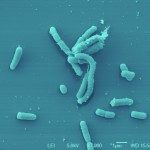Lien vers Pubmed [PMID] – 37126517
Lien DOI – 10.1371/journal.pntd.0010362
PLoS Negl Trop Dis 2023 May; 17(5): e0010362
Plague is a zoonotic disease caused by the bacterium Yersinia pestis, highly prevalent in the Central Highlands, a mountainous region in the center of Madagascar. After a plague-free period of over 60 years in the northwestern coast city of Mahajanga, the disease reappeared in 1991 and caused several outbreaks until 1999. Previous research indicates that the disease was reintroduced to the city of Mahajanga from the Central Highlands instead of reemerging from a local reservoir. However, it is not clear how many reintroductions occurred and when they took place.In this study we applied a Bayesian phylogeographic model to detect and date migrations of Y. pestis between the two locations that could be linked to the re-emergence of plague in Mahajanga. Genome sequences of 300 Y. pestis strains sampled between 1964 and 2012 were analyzed. Four migrations from the Central Highlands to Mahajanga were detected. Two resulted in persistent transmission in humans, one was responsible for most of the human cases recorded between 1995 and 1999, while the other produced plague cases in 1991 and 1992. We dated the emergence of the Y. pestis sub-branch 1.ORI3, which is only present in Madagascar and Turkey, to the beginning of the 20th century, using a Bayesian molecular dating analysis. The split between 1.ORI3 and its ancestor lineage 1.ORI2 was dated to the second half of the 19th century.Our results indicate that two independent migrations from the Central Highlands caused the plague outbreaks in Mahajanga during the 1990s, with both introductions occurring during the early 1980s. They happened over a decade before the detection of human cases, thus the pathogen likely survived in wild reservoirs until the spillover to humans was possible. This study demonstrates the value of Bayesian phylogenetics in elucidating the re-emergence of infectious diseases.

